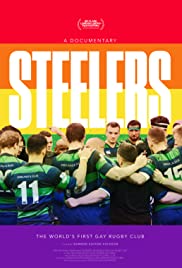
STEELERS/ STEELERS: THE WORLD'S FIRST GAY RUGBY CLUB
UK, 2020, 80 minutes, Colour.
Eammon Ashton-Atkinson, Nick Evans, Simon Jones, Andrew McDowell.
Directed by Eammon Ashton Atkinson.
Many audiences will never have considered a gay rugby club. In fact, as this documentary tells us, the first such club originated in conversation at Kings Cross Station in London in 1995. And, at first, there was a hesitation for men to join such clubs. There was even more hesitation in straight clubs wanting to play such teams let alone enter into a competition. This film was made in 2018, many clubs around the world having emerged, and an international competition for the Bingham Cup (played in Amsterdam with some attractive touristic background).
This is a very personalised documentary, inviting the audience into its theme of the gay rugby club, but even more personally, inviting the audience to listen to several stories. Audiences respond to stories, getting to know people better through their stories.
The film is the personal testimony, with autobiographical information, about lawyer turned journalist, Eammon Ashton-Atkinson, from Sydney. He wrote, directed and edited this film, having moved into filmmaking. He incorporates a number of photos illustrating his past, a quiet boy, coming to understand his sexual orientation, bullied and outed at his boys only boarding school. He explains that, when he went to London, hearing of the club, interested in rugby, he joined, found a fraternity, bonding with the members of the team, enjoying playing the sport.
Then it is something of a surprise that he introduces us to Nic Evans from Wales. In fact, she is the coach of the particular team that is the subject of the film, the Steelers. After explaining something about herself, illustrating her life, her enthusiasm for football, the continued guidance and instruction while she was still at school by her football-fan grandfather, she does raise the question of why a gay woman would be the coach of a gay men’s team. She is a genial personality, an extended interview with her recurring throughout the film, her reflections on herself, her football career, the effect of coaching, her emotions but yet her moments of intimidating recalcitrant players. She is a woman worth meeting.
The other two characters are members of the team. One is (and one struggles to find a respectful word to describe the heavy build – fortunately, he refers to himself as “stocky”, something of an understatement) Andrew McDowell, Drew to his friends. An American, he came as social secretary in London to the Steelers, found he enjoyed play, but, he says he is exuberantly self-centred, loves having people’s attention, finding that he could do this by becoming a Drag Queen (liberal excerpts throughout the film). Obviously, he has a lot to say about being gay, perceptions, defiance of perceptions.
The most personal interview is that with a player from Birmingham, Simon Jones, an extended interview recurring throughout the film. Again, with many photos. He enjoyed rugby, had a loving family, knew that he was gay, took a long time to come out to his family. He seems a genial person and it is rather sad to discover that he was plagued by depression, reliant on antidepressants, but finding some kind of affirmation and bonding with the Steelers.
Oh, there is the competition and there are some glimpses of matches, teams from Ireland, teams from Sydney, the usual close-ups of scrums, wings running and scoring, penalty conversions… But, in many ways this is just the background to the personal stories.
In the more recent past, many gay men have regretted that there are a few role model characters in films, characters that younger gay men can identify with. This film offers some role models and some encouragement, and breakthrough from homophobia.